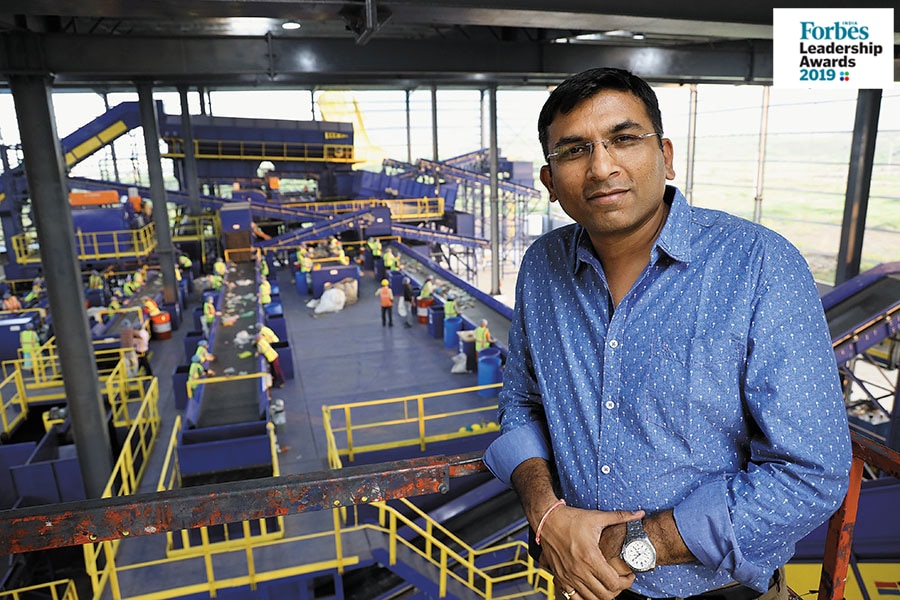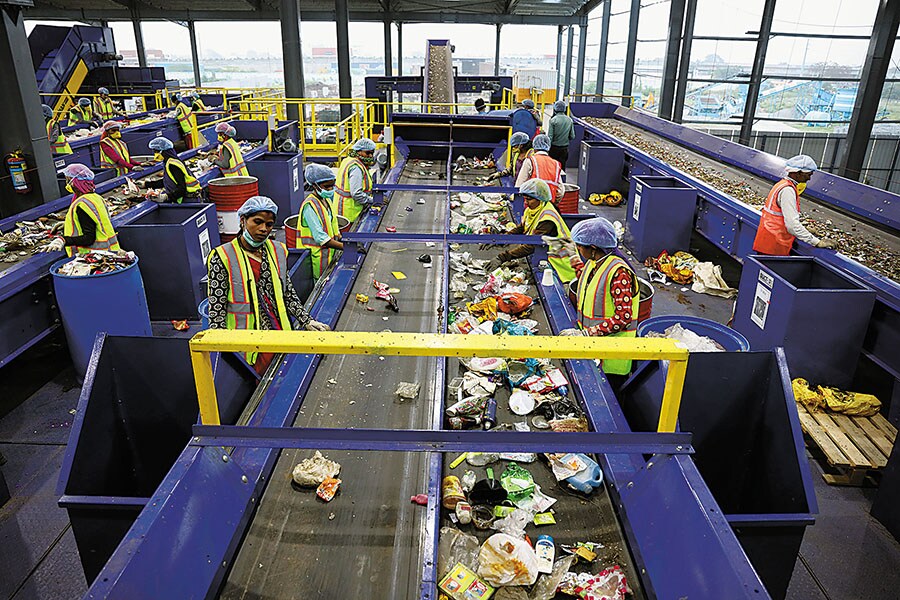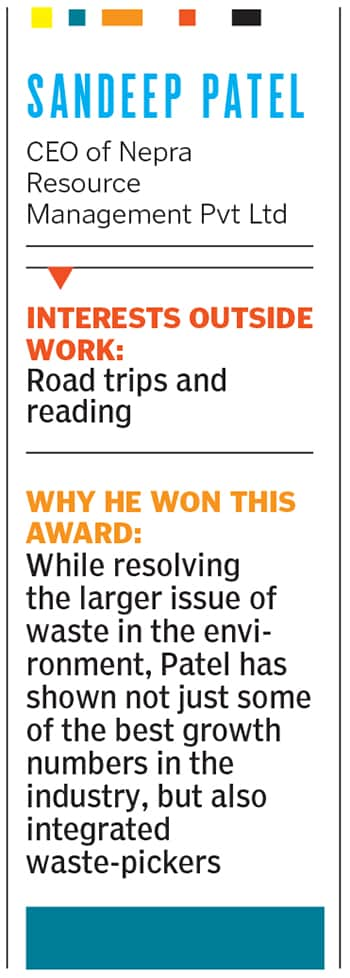FILA Entrepreneur with Social Impact 2019: Nepra CEO Sandeep Patel
Patel has built a successful business out of waste in the last eight years, and has managed to integrate and empower waste-pickers in the process


 Anyone who is ideating, creating this plant or collecting waste, comes under the category of a Swachh Bharat entrepreneur: Sandeep patel, CEO, Nepra Resource Management Pvt Ltd.
Anyone who is ideating, creating this plant or collecting waste, comes under the category of a Swachh Bharat entrepreneur: Sandeep patel, CEO, Nepra Resource Management Pvt Ltd.
Image: Akashdeep Verma for Forbes India[br]In the two years after he set up Nepra Resource Management Pvt Ltd, a dry waste management company, Sandeep Patel approached 70 venture capitalists for funding and got rejected by 68. When he finally got his first round of funding of ₹3 crore in February 2013, three months on, on a Friday morning, a fire broke out at his plant. “The team had been excited about getting their first round of funding and Nepra had ordered new machinery,” says Patel, 40. Besides, only 25 percent of the plant was covered, and they planned to use the money to build a shade over the remaining 75 percent. But everything changed when Patel, who had slept at 2 am that day, got a call at 4.30 in the morning. All that he had built so far had been burned to the ground. “We suffered a loss of approximately ₹1.5 crore,” he recollects.
Though shaken by the turn of events, he quickly recovered his composure. As soon as he reached the spot, Patel and his team started distributing tasks. They met with the employees and blue-collar workers, seeking their opinion on how to go forward. Everyone, even the daily wage workers, stood by him, willing to continue work and get paid only when Patel had the resources.
Patel’s team was back to work on Monday, with waste collection back on track.
It was a tough few months for Patel as he struggled to get the business upbeat again. With no further support coming from VC firms, the promoters started investing their savings. Patel took a loan from his friends and relatives, and he and his family lived off a credit card, keeping expenses to a minimum for the next few months.
Eight years down the line, as he sits in his newly-commissioned plant in Indore, Patel says he has another two plants coming up in Pune and Jamnagar, and plans to expand further pan-India. In just the last one year, Nepra has grown from 180 employees to 450. The company, with an Ebitda margin of 5-7 percent, has been growing at almost 100 percent year-on-year and has been operationally profitable for two years now even as it continues to uplift the weaker sections of society, creating “entrepreneurs” as well as an environmental impact through its segregation and recycling operations.“The Indore unit is India’s first 300 metric tonne (MT) plant,” says Patel of the plant spread over approximately three acres that has been designed by Turkish firm Disan, and was built at a cost of ₹30 crore. Nepra has two plants in Ahmedabad, with a total capacity of 100 MT.
While a majority of the machines have been bought from and installed by Disan, three optical sorting machines were bought from German company Tomura. The plant was commissioned in October and Patel is busy fine-tuning machinery and processes.
“Train the trainer is something we are working on,” Patel says as he sits down with a team to teach them the processes in the plant. “My co-founders and I are spending so much time in Indore to train just 10 people so that they pass on the skills to another 10. We, thus, are able to train 100 people,” he adds, putting in place the processes he has arrived at in his eight-year journey in dry waste management.
Patel, who did his MBA in ecommerce strategy and project management from Leeds Beckett University in London, returned to India in 2002. Fifteen days after landing, he found himself engaged to be married. He had no job in hand and took up a position in an IT company, but knew that ultimately he wanted to be a businessman. “Two months after I got married in 2003, I left the job and started my first business,” says Patel.
Between 2003 and 2006, Patel, who had always been interested in retail and in waste, worked in the BPO business, started a travel company and a chemical business. The retail sector was overcrowded, but when he was working as a chemical trader Patel saw the potential in industrial waste. “You either create a niche for yourself or pump in a lot of money,” he says.
A portmanteau of his wife’s name, Neha, and his niece’s name, Pranali, who at the time lived with the Patels, he launched Nepra Environmental Solutions Pvt Ltd in 2006 in his home city, Ahmedabad in Gujarat.
One of his first clients was Larsen & Toubro, who would want them to clean up solar package installations or do other clean-ups. Nepra also partnered with hotels, hospitals and corporate offices to collect dry waste.
It was Patel’s interest in other verticals, like organising the sector and scaling it up while generating alternate sources of revenue for Nepra, which led the company to get into the dry waste collection systems. Until then, the sector was driven by raddiwalas and kabadiwalas who were mostly unorganised.
Nepra Environmental Solutions, an umbrella for 18 online and offline businesses became Nepra Resource Management. It started focusing on two core businesses, waste collection and segregation, aiming at ‘zero-waste-to-landfill’ by selling the segregated waste to clients across India, including cement kilns for refuse-derived fuel (RDF), plastic recycling units and paper mills. It also has a paper and plastic recycling unit in Ahmedabad.
Nepra launched an initiative, ‘Let’s Recycle’, to create awareness among people for waste segregation. “Before 2014, there wasn’t much awareness about waste. So, when we told people about ‘Let’s Recycle’, they understood what we do,” says Patel.
To bring clients on board, Nepra had to build trust with companies, provide them with transparent solutions and regular services. “We believe our service is an addiction. If you start getting used to regular waste pick-ups, you will not look at other options,” he says. Nepra’s clients include industry, hotels, hospitals, households and corporate offices. One of Nepra’s focus areas is to bring women waste-pickers into the formal workforce
One of Nepra’s focus areas is to bring women waste-pickers into the formal workforce
Image: Akashdeep Verma for Forbes India[br]In Ahmedabad, Nepra oversees waste management and waste collection activities. A point-to-point waste collection company, it uses two apps—one for garbage collectors and one for consumers. The app used by garbage collectors employs facial recognition for easy login, a colour-coded menu, bigger fonts and an easy-to-use interface the app used by customers is like an “Uber for waste” with easy tracking of the garbage loading truck, and its arrival details.
While the company has its own system to collect waste in Ahmedabad, in Indore it has tied up with the municipal corporation to get them dry waste every day.
Having worked in the chemicals industry, Patel has no qualms about getting his hands dirty and learning and building solutions from the ground up. “I have worked in an activated carbon business and I used to go home and shower, and the carbon would turn the water black. I have lifted drums while working in my chemicals business, my father for some time had a mining business, so I never had a problem getting my hands dirty,” he says.
It is this approach, his seeing the potential in people, and his passion that has drawn people to the company, from his partners, to the waste pickers the company works with, to investors. When his co-founder Ravi Patel, the son of his father"s friend, went through a tough patch with his business and approached him for a job, he instead made him a partner in his chemical trading business, a partnership that continued into Nepra. “I thought an entrepreneur should remain an entrepreneur,” he says.
The third co-founder, Dhrumin Patel, became a part of Nepra in 2011. Dhrumin, a distant relative of Patel’s, was looking to do something in plastic recycling. Patel told Dhrumin that he was doing a bit of what Dhrumin had in mind, and got him on board.
“I have a very good team, co-founders who complement me. I am more of a business process and reengineering guy. Dhrumin is an eye-for-detail, numbers guy who remembers almost every minute detail. I can thus look at macro and have the comfort of him looking at micro,” says Patel. “Ravi is our behind-the-scenes guy. If we need anything to be done, we know Ravi is the guy,” he adds.
Nepra has raised ₹73 crore till date and is backed by venture capital firms Aavishkaar and Asha Impact. It is now in the process of a ₹300 crore fundraise.
“Nepra has been growing rapidly and will continue to grow very rapidly for the foreseeable future given the magnitude of waste generation,” says Ajay Maniar, partner at Aavishkaar, which has backed Nepra from two of its funds. “We have funded Nepra from the current fund and will hopefully continue to back it. We are planning for Nepra to file for an IPO in the next four to five years.” He adds that back in February 2013 they decided to fund Nepra for one simple reason: Nepra promised to deal with waste in a way no one else had before. “Nepra dealt with waste, from the former ‘lifting and shifting’ method to actually trying to resolve it. It (the decision to back Nepra) was after seeing the leadership’s commitment towards the problem and their inclusive approach towards all stakeholders,” says Maniar.
Among the many challenges Patel has faced, dealing with stereotypes tops the list. Patel himself faced the challenge of having to explain his business to people, considering his education. Tracking and retaining qualified talent is another challenge he faces. But as Patel puts it, it is not the education of his employees that he looks at, but their passion towards the common goal.
Vaibhav Kapoor, project manager at Nepra’s Indore plant, is just one of the examples. Kapoor, who first connected with Patel while pursuing a degree in civil engineering, considered Patel as the guide for his thesis on solid waste management.
After his Master’s degree, Kapoor worked with Godrej and PwC before making the move from a cushy corporate job to joining Nepra, because he believed in Patel’s vision for the company. Kapoor says, “[Patel] called me last year and told me how big Nepra has become.” Patel told him about the expansion plans to Indore and called Kapoor to the Ahmedabad office, asking him to join. “He was very keen on getting me on board,” adds Kapoor.
Meanwhile, Nepra continues to keep its waste pickers at the heart of everything it does. The company provides them transparency and immediate payment, and Patel claims that the earnings of waste-pickers have improved by as much as 35 percent. With improved earnings, waste-pickers are able to educate their children, they’re able to pay their dues and don’t take on additional debt. The company also tries to empower women from working class areas, bringing them into a formal workforce.
Nepra also constantly tries to change the way people perceive the waste management system.
Through the process, Patel says he is creating “entrepreneurs”, adding that he considers everyone, from himself to every stakeholder in his waste management business a “Swachh Bharat Entrepreneur”. “A person who is ideating and creating this plant and the person who is collecting waste, all come under the category of Swachh Bharat entrepreneurs. We have made it an acceptable term for a person in the waste segregation business, who wants to be born [into], grow and make money in the business.”
First Published: Dec 02, 2019, 10:41
Subscribe Now